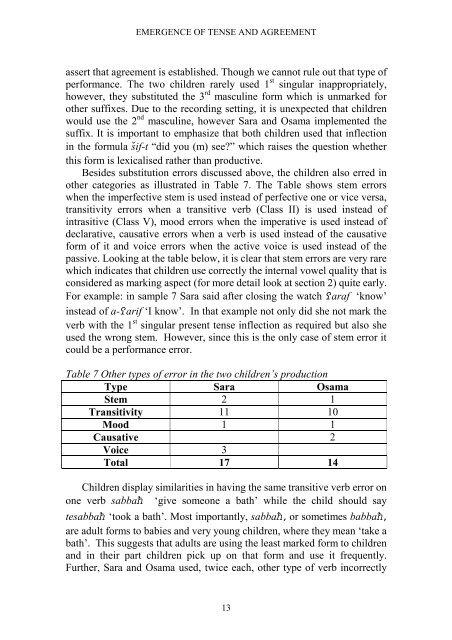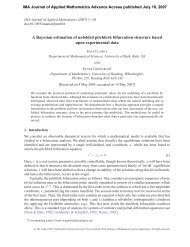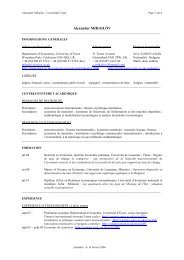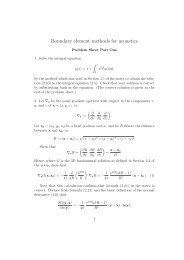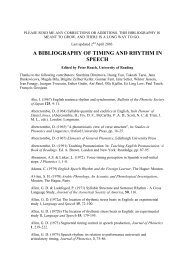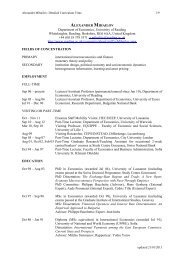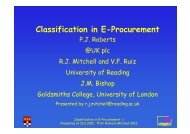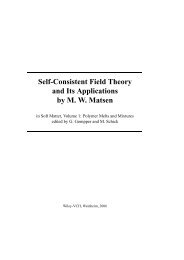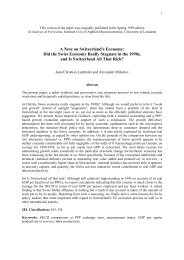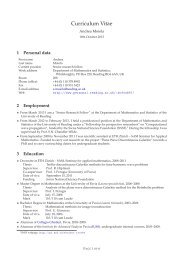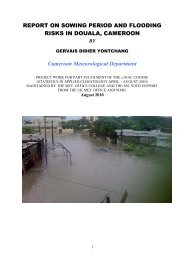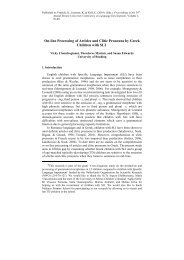Reading Working Papers in Linguistics 4 (2000) - The University of ...
Reading Working Papers in Linguistics 4 (2000) - The University of ...
Reading Working Papers in Linguistics 4 (2000) - The University of ...
Create successful ePaper yourself
Turn your PDF publications into a flip-book with our unique Google optimized e-Paper software.
EMERGENCE OF TENSE AND AGREEMENT<br />
assert that agreement is established. Though we cannot rule out that type <strong>of</strong><br />
performance. <strong>The</strong> two children rarely used 1 st s<strong>in</strong>gular <strong>in</strong>appropriately,<br />
however, they substituted the 3 rd mascul<strong>in</strong>e form which is unmarked for<br />
other suffixes. Due to the record<strong>in</strong>g sett<strong>in</strong>g, it is unexpected that children<br />
would use the 2 nd mascul<strong>in</strong>e, however Sara and Osama implemented the<br />
suffix. It is important to emphasize that both children used that <strong>in</strong>flection<br />
<strong>in</strong> the formula s#if-t “did you (m) see?” which raises the question whether<br />
this form is lexicalised rather than productive.<br />
Besides substitution errors discussed above, the children also erred <strong>in</strong><br />
other categories as illustrated <strong>in</strong> Table 7. <strong>The</strong> Table shows stem errors<br />
when the imperfective stem is used <strong>in</strong>stead <strong>of</strong> perfective one or vice versa,<br />
transitivity errors when a transitive verb (Class II) is used <strong>in</strong>stead <strong>of</strong><br />
<strong>in</strong>trasitive (Class V), mood errors when the imperative is used <strong>in</strong>stead <strong>of</strong><br />
declarative, causative errors when a verb is used <strong>in</strong>stead <strong>of</strong> the causative<br />
form <strong>of</strong> it and voice errors when the active voice is used <strong>in</strong>stead <strong>of</strong> the<br />
passive. Look<strong>in</strong>g at the table below, it is clear that stem errors are very rare<br />
which <strong>in</strong>dicates that children use correctly the <strong>in</strong>ternal vowel quality that is<br />
considered as mark<strong>in</strong>g aspect (for more detail look at section 2) quite early.<br />
For example: <strong>in</strong> sample 7 Sara said after clos<strong>in</strong>g the watch $araf ‘know’<br />
<strong>in</strong>stead <strong>of</strong> a-$arif ‘I know’. In that example not only did she not mark the<br />
verb with the 1 st s<strong>in</strong>gular present tense <strong>in</strong>flection as required but also she<br />
used the wrong stem. However, s<strong>in</strong>ce this is the only case <strong>of</strong> stem error it<br />
could be a performance error.<br />
Table 7 Other types <strong>of</strong> error <strong>in</strong> the two children’s production<br />
Type Sara Osama<br />
Stem 2 1<br />
Transitivity 11 10<br />
Mood 1 1<br />
Causative 2<br />
Voice 3<br />
Total 17 14<br />
Children display similarities <strong>in</strong> hav<strong>in</strong>g the same transitive verb error on<br />
one verb sabba! ‘give someone a bath’ while the child should say<br />
tesabba! ‘took a bath’. Most importantly, sabba!, or sometimes babba!,<br />
are adult forms to babies and very young children, where they mean ‘take a<br />
bath’. This suggests that adults are us<strong>in</strong>g the least marked form to children<br />
and <strong>in</strong> their part children pick up on that form and use it frequently.<br />
Further, Sara and Osama used, twice each, other type <strong>of</strong> verb <strong>in</strong>correctly<br />
13


